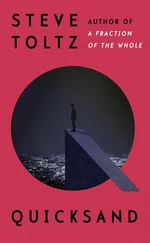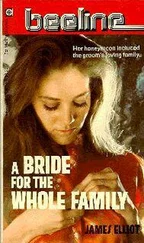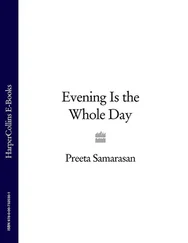Eddie opened the door, combing his thin hair. Gel dripped off the comb in large dollops I could smell. I cut straight to the point.
“Why are you always so good to my father?”
“What do you mean?”
“You’re always offering money and help and kindness. Why? Dad says it started the day you met him in Paris.”
“He said that?”
“Yes.”
“So I don’t understand- what is it you want to know?”
“This generosity of yours. What’s behind it?”
Eddie’s face was strained. He finished combing his hair while searching for the right words to answer me.
“And while you’re answering that one, answer this: why are you always taking photographs of us? What do you want with us?”
“I don’t want anything.”
“So it’s just plain friendship.”
“Of course!”
“Then you might be able to give us a million dollars.”
“That’s too much.”
“Well, how much can you get?”
“Maybe, I don’t know, a sixth of that.”
“How much is that?”
“I don’t know.”
“Well, Dad’s been saving, and I don’t know how much he’s got, but it won’t be enough.”
“Enough for what?”
“To help him.”
“Jasper, you have my word. Whatever I can do, or give you.”
“So you’ll give us a sixth of a million dollars?”
“If it would help you and your father.”
“You’re crazy.”
“I’m not the one in hospital, Jasper.”
I suddenly felt bad about harassing Eddie. He really was a rare person, and clearly their friendship meant a lot to him. I even got the impression he thought it contained a deep spiritual quality that was in no way lessened by the fact that Dad occasionally hated his guts.
When I went back to the hospital, Dad was strapped to a bed in the same olive-green room. I peered over him. His eyes rolled around in his head like marbles tossed into a teacup. I bent over and whispered in his ear. I wasn’t certain he was listening, but I whispered myself hoarse. Afterward, I pulled the chair up next to him and put my head on his rising and falling stomach and fell asleep. When I woke, I realized that someone had put a blanket over me and a croaky voice was talking. I don’t know when Dad had started his monologue, but he was already in the middle of a sentence.
“…and that’s why they said that architecture was like reproducing the universe, and all the old churches and monasteries were attempting the divine task of replicating heaven.”
“What? What’s going on? Are you OK?”
I could see only the odd shape of his head. He was straining to hold it up. I stood, turned on the light, and undid the bed straps. He turned his head from side to side, trying out his neck.
“We are going to construct a world, Jasper, of our own design, where no one can come in unless we ask them.”
“We’re going to build a world of our own?”
“Well, a house. All we have to do is design it. What do you think of that?”
“I think that’s great,” I said.
“And you know what else, Jasper? I want this to be your dream too. I want you to help me. I want your input. I want your ideas.”
“OK. Yeah. Great,” I said.
It had worked. In his sandstorm, Dad had found a new project. He’d decided to build a house.
Per his instructions, I brought Dad every book on the theory and history of architecture I could find, including weighty tomes on animal buildings such as birds’ nests, beaver dams, honeycombs, and spiders’ burrows. He took the books with delight. We were going to build a container for our moldy souls!
Dr. Greg came in and noted the piles of architectural literature. “What’s going on here, then?”
Proudly, Dad told him the idea.
“The Great Australian Dream, huh?”
“Sorry?”
“I said, you’re going to pursue the Great Australian Dream. I think that’s a very good idea.”
“What do you mean? There’s a collective dream? How come nobody told me? What is it again?”
“Owning your own home.”
“Owning your own home? That’s the Great Australian Dream?”
“You know it is.”
“Wait a minute. Haven’t we merely appropriated the Great American Dream and just substituted the name of our country?”
“I don’t think so,” Dr. Greg said, looking worried.
“Whatever you say,” Dad said, rolling his eyes so we both could see it.
***
A week later I went back. The books were open and pages torn up and scattered all over the room. When I entered, Dad held up his head like a hoisted sail. “Glad you’re here. What do you think of manifesting the symbolic paradise of the womb, a house huge and glistening, and we’ll bury ourselves inside where we can really rot in privacy?”
“Sounds good,” I said, moving a pile of books off the chair so I could sit down.
“Tell me if any of these say anything to you: French chateau, English cottage, Italian villa, German castle, peasant simplicity.”
“Not really.”
“But geometric simplicity, OK? Fundamentally simple, uncluttered, loud, pretentious, and gaudy, without being dispiritingly tasteless.”
“Whatever you like.”
“Above all, I don’t want anything angular, so maybe it should be round.”
“Good idea.”
“You think so? Do you feel like living in an orb?”
“Yeah, that sounds fine.”
“What we want is to blend into the natural surroundings. An organic synthesis, that’s what we’re after. And inside I think two bedrooms, two bathrooms, a living room, a kitchen, and a dark room, not to develop photos, just so we can sit in the dark. Now, what else? Let’s talk about the threshold.”
“The what?”
“The portal into the home.”
“You mean the front door?”
“How many times do I have to say it?”
“Just once would be good.”
Dad’s eyes narrowed into thin slits and the edges of his mouth curled downward. “If you’re going to be that way about it, we’ll just scrap the whole design. What about living in a cave?”
“A cave?”
“I thought we agreed we’d live in a uterine symbol.”
“Dad.”
“Well, what if we live in the trunk of an old tree, like Merlin? Or wait. I know. We could construct platforms in the trees. What do you say, Jasper- are we tree-dwellers?”
“Not especially.”
“Since when don’t you want to live in leafy sensuality?”
Dr. Greg had come into the room. He was ogling us like a Supreme Court judge watching a couple of neo-Nazis wash his car at traffic lights.
“Dad, let’s just have an ordinary house. Just a nice, normal, ordinary house.”
“You’re right. We don’t need to go over the top. OK. Which do you prefer? A cubical ordinary house or a cylindrical ordinary house?”
I sighed. “Cubical.”
“Have you ever seen the Tower of Samara in Iraq?”
“No. Have you?”
“OK. Here’s a structural dilemma we have to overcome. I want to hear the echo of my own footsteps, but I don’t want to hear yours. What can we do about that?”
“I don’t know.”
“All right, then. Let’s talk ceilings. Do you want high ceilings?”
“Of course. Why would anyone want a low ceiling?”
“To hang yourself. OK? Hang on a sec. Let’s see…” Dad rummaged through his books. “Tepee?”
“Come on, Dad, what’s happened to your brain? You’re all over the place.”
“You’re right. You’re right. We need to focus. We need to be sensible. We need to be logical. So let’s be logical. What are the objectives inherent in the design of a house? To meet your physical needs. Eating, sleeping, shitting, and fucking. That translates to comfort, utility, efficiency. But our psychological needs? The same, really. In fact, I don’t see why we should separate ourselves from primitive man in this. Our goal should be to exist in a consistent climate and to keep out predators.”
Читать дальше












